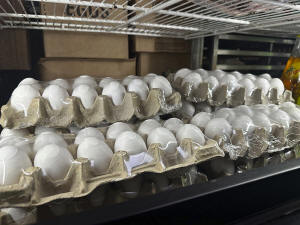US eggs prices hit a record high of $4.95 and are likely to keep
climbing
 Send a link to a friend
Send a link to a friend
 [February 13, 2025] By
JOSH FUNK [February 13, 2025] By
JOSH FUNK
OMAHA, Neb. (AP) — Egg prices hit a record high as the U.S. contends
with an ongoing bird flu outbreak, but consumers didn't need government
figures released Wednesday to tell them eggs are terribly expensive and
hard to find at times.
The latest monthly consumer price index showed that the average price of
a dozen Grade A eggs in U.S. cities reached $4.95 in January, eclipsing
the previous record of $4.82 set two years earlier and more than double
the low of $2.04 that was recorded in August 2023.
The spike in egg prices was the biggest since the nation's last bird flu
outbreak in 2015 and accounted for roughly two-thirds of the total
increase in food costs last month, according to the U.S. Bureau of Labor
Statistics.
Of course, that is only the nationwide average. A carton of eggs can
cost $10 or more in some places. And specialized varieties, such as
organic and cage-free eggs, are even more expensive.
“We do use eggs a little less often now. You know, because of the
price,” said Jon Florey as he surveyed his options in the egg case at
Encinal Market in Alameda, California. “I was going to make a quiche
that I like to make and it’s about six eggs, so I figured I’d do
something else.”
When are egg prices expected to go down?
Relief is not expected any time soon. Egg prices typically spike around
Easter due to high holiday demand. And the U.S. Department of
Agriculture predicted last month that egg prices were likely to go up
20% this year.
Even if shoppers can afford eggs, they may have difficulty finding them
at times. Some grocers are having trouble keeping their shelves stocked,
and customers are encountering surcharges and limits on how many cartons
they can buy at a time.

Encinal Market owner Joe Trimble said he has a hard time getting all the
eggs he orders from his suppliers, so most of the time his shelves are
only about 25% full.
“It’s something you don’t think about until you look at the shelf and
it’s nearly empty," Trimble said. Eggs are “just expected to be there in
the same way you expect there to be milk. It’s a key item to have in a
grocery store because people don’t go out looking for something else to
eat on a Saturday morning. They want it. They want to have some
scrambled eggs or over-easy eggs on a Saturday morning.”
How bad is the bird flu outbreak?
The main reason that eggs are more expensive is the bird flu outbreak.
When the virus is found on a farm, the entire flock is killed to limit
the spread of disease. Because massive egg farms may have millions of
birds, just one outbreak may put a dent in the egg supply. Nearly 158
million birds have been slaughtered overall since the outbreak began.
The Agriculture Department says more than 23 million birds were
slaughtered last month and more than 18 million were killed in December
to limit the spread of the bird flu virus. Those numbers include turkeys
and chickens raised for meat, but the vast majority of them were
egg-laying chickens.
[to top of second column] |

Cartons of eggs sit inside cooler at Norma's Sweets Bakery Tuesday,
Feb. 11, 2025, in New Orleans. (AP Photo/Stephen Smith)
 And when there is an outbreak on a
farm, it often takes several months to dispose of the carcasses,
sanitize the barns and raise new birds until they are old enough to
start producing eggs, so the effects linger.
Bird flu cases often spike in the spring and fall when wild birds
are migrating because they are the main source of the virus, but
cases can pop up any time of year. The virus has also spread to
cattle and other species, and dozens of people — mostly farmworkers
taking care of ill animals — have been sickened.
But health officials say the threat to human health remains low and
eggs and poultry are safe to eat because sick animals aren't allowed
into the food supply. Plus, properly cooking meat and eggs to at
least 165 degrees Fahrenheit kills any virus, and pasteurization
neutralizes bird flu in milk.
What else is driving egg prices up?
Egg farmers also face higher feed, fuel and labor costs these days
because of inflation. Plus, farmers are investing more in
biosecurity measures to try to protect their birds.
Ten states have passed laws allowing the sale of eggs only from
cage-free environments. The supply of those eggs is tighter and
focused in certain regions, so the effect on prices can be magnified
when outbreaks hit cage-free egg farms.
Many of the egg farms with recent outbreaks were cage-free farms in
California. Cage-free egg laws have already gone into effect in
California, Massachusetts, Nevada, Washington, Oregon, Colorado and
Michigan.
Total demand for eggs is also up significantly in recent years.
Consumers are buying more eggs, and the growth of all-day breakfast
restaurants is adding to demand.
CoBank analyst Brian Earnest said the current cost of eggs could
discourage some buying, which would ease the demand pressure but
might not have a noticeable effect. It will likely take months for
egg producers to fill the gaps in supply.
“As consumers continue to stock up on eggs, supplies at the store
level will remain tight, and with Easter right around the corner,
that could prolong the tighter supplies,” Earnest said.
While prices remain elevated, producers of baked goods and other
food items that rely on eggs as a main ingredient will have to
decide how much to increase prices or reduce production, he said.
___
Associated Press reporter Terry Chea contributed to this report from
Alameda, California.
All contents © copyright 2025 Associated Press. All rights reserved
 |